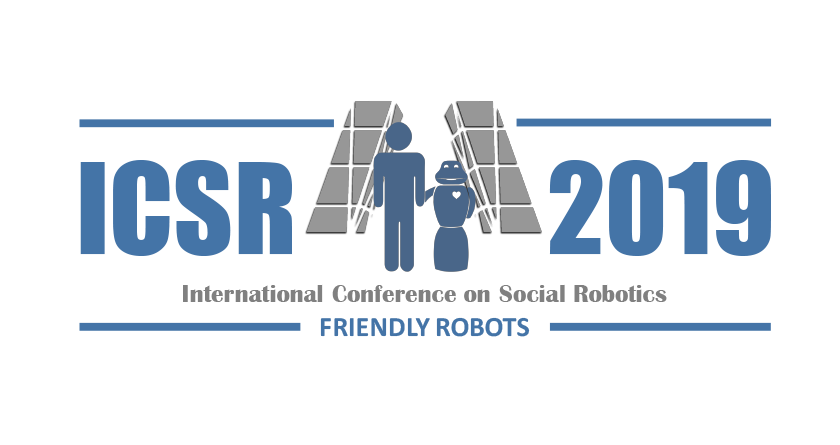Workshops
Offered Workshops
- WS1 - The Communication Challenges in Joint Action for Human-Robot Interaction
- WS2 - Perspectives on human-aware navigation
- WS3 - Self-coaching tools for conducting responsible research and innovation (RRI) with social robots
- WS4 - Quality of Interaction in Socially Assistive Robots (QISAR)
- WS5 - Experimental and Integrative Approaches to Robo-ethics (EIAR 2019)
- WS6 - Robots in the Wild: from the lab, field and showrooms to real-world experiences in social robotics
WS1 - The Communication Challenges in Joint Action for Human-Robot Interaction
An important area of social robotics is devoted to design robotic agents able to establish interpersonal interactions with humans, so they can work together as a team to perform a joint action. In order to do that, social robotics have taken inspiration from a psychology and philosophy of mind to explore multiple psychological devices and abilities that are required to achieve joint actions. Some of these mechanisms underpinning human interactions aim at establishing communication, so the participants can receive and provide reliable information they can use to coordinate to achieve their common goal.
These communicative skills open up a group of questions, especially when they are posed in the context of human-robot interaction. How do humans integrate such a diverse array of communicative skills? What desiderata are required for establishing communication in joint action? Are there differences between the communicative skills necessary for conversations and those necessary for joint action? Are the differences between verbal and non-verbal communication important for HRI? Which can be applied to the domain of human-robot interaction? Does the actual state of robotic regarding communication allow to improve the necessary condition for joint actions for HRI?
The aim of this workshop is to establish an interdisciplinary debate on the challenge that communication supposes for joint action in the context of human-robot interaction. As part of "toward a framework for Joint Action" series (fja.sciencesconf.org), it aims to give philosophers, psychologists and roboticists a venue to discuss and share their knowledge and questions regarding the notion of communication during robot-human interaction.
Topics of interest:
- Communication in HRI (and related particularities)
- Verbal vs non-verbal in HRI
- Plurality of Speech acts
- Grounding Problem
- Negotiation of Joint goals
- Commitments
- Repair strategies during joint action
WS2 - Perspectives on human-aware navigation
As robots are becoming better at navigating in dynamic environments, their operating areas start to include humans. Furthermore, there exist more and more robots with a dedicated social task involving humans. With these developments, robots need to acquire skills for sharing a physical space with humans. This includes navigating in a human-friendly way and adhering to social rules. As a minimum, robots need to take the personal space of humans into account and respect social distances. In psychology there is a broad discipline studying social distances, called proxemics. It is relevant to investigate how robots can take our personal space into account. Several studies have investigated the relation between personal space and comfortable approach distances of a robot with varying results. From a more technological perspective, several navigational algorithms have been developed that take humans into account.
The main goal of the current workshop is to bring researchers within the field together to allow them to share their view on the topic. Furthermore, several different perspectives of human-aware navigation will be highlighted to try and find the common ground. This includes a psychological perspective on proxemics and human-aware navigation, and also a more technological perspective focusing on human-aware navigation algorithms. Additionally, there will be focus on a perspective on experimental research where human-robot proxemics is investigated. Lastly, the aim is an overview paper together with the attendants of the workshop on the different perspectives of human-aware navigation and publish this in a relevant journal.
WS3 - Self-coaching tools for conducting responsible research and innovation (RRI) with social robots
Innovating is about creating and transforming the future of society. However, to ensure a desirable future for humanity, innovation needs to be responsible. The Responsible Research and Innovation (RRI) framework guides all the societal actors involved in research and innovation (R&I) processes towards reflecting upon the consequences of their research for society.
One of the most challenging aspects of being able to put into practice RRI, however, is HOW TO specifically implement it in everyday R&I practices.
Our workshop has an eminently practical structure. The main focus is to provide attendees with a series of tools based on auto-coaching techniques that will empower them to be able to conduct self-guided RRI in a very short period of time (half-day session). Also, we aim at developing together with the participants a series of guidelines useful to the social robots’ research community to conduct RRI. The workshop will also provide room for short paper presentations on the topic of conducting RRI with social robots.
RRI has progressively become a top priority by the European Research Policies and it is a must for all researchers and innovators to know the basics of how to conduct ethical research based on this approach.
This half-day workshop will focus on the quality of interaction in socially assistive robots. Robots are entering our everyday lives, which brings about human-robot interactions across in diverse settings including private homes, workplaces, health care centers, schools, and public spaces. To facilitate successful interaction between humans and robots, it is essential that the interaction between robots and their users be of high quality; not only to ensure that the interaction is natural for the users but also to prevent misunderstandings by the users with potential harm as a result.
WS4 - Quality of Interaction in Socially Assistive Robots (QISAR)
This half-day workshop will focus on the quality of interaction in socially assistive robots. Robots are entering our everyday lives, which brings about human-robot interactions across in diverse settings including private homes, workplaces, health care centers, schools, and public spaces. To facilitate successful interaction between humans and robots, it is essential that the interaction between robots and their users be of high quality; not only to ensure that the interaction is natural for the users but also to prevent misunderstandings by the users with potential harm as a result.
The workshop aims to be a forum for discussion on what defines the quality of interaction from a range of different perspectives. It will be an opportunity to discuss methodologies and approaches to achieve a high quality of interaction, as well as how to combine different qualitative and quantitative metrics for a general evaluation of interaction between SAR and their users. This workshop aims to enhance our knowledge of the quality of human-robot interactions to lead better HRI.
We invite researchers from different backgrounds ranging from psychology, sociology, computer vision, human-robot interaction design, natural language processing, machine learning, neuroscience, ethics and robotics, among others. It will be an excellent opportunity for sharing the ideas towards understanding the quality of interaction in SAR and potentially define guidelines for a standardized definition and evaluation.
WS5 - Experimental and Integrative Approaches to Robo-ethics (EIAR 2019)
The development and diffusion of social robots gives increasingly rise to ethical and legal concerns related to, e.g., responsibility assignments in cooperative tasks, implementation of moral rules in robots, possible dual uses and misuses of artificial agents, unintended modifications of social, cognitive, emotive and communication abilities in humans interacting with robots. The urgency of developing effective ethical inquiries related to these issues leads specialists to acknowledge the need to overcome classical approaches, based exclusively on philosophical analysis. Emerging trends are incorporating, within the frameworks of ethical inquiries on social robots, a series of methods, tools and scenarios defining empirical research in Social Robotics and HRI.
The main goal of the Experimental and Integrative Approaches to Robo-ethics (EIAR 2019) workshop is to discuss possibilities, limits and ways of this new orientation, with a specific focus on the role that experiments can play in addressing ethical and legal issues concerning (social) human-robot interaction. To this end the workshop will propose a number of presentations illustrating concrete pioneering experimental and integrative approaches in Robo-ethics, and stimulate structured discussion directed to their development, improvement and diffusion. The ultimate aspiration is to activate the process of constitution of an interdisciplinary community engaged in the development of a well-defined research line in Experimental and Integrative Robo-ethics.
Topics of interest:
- (Experimental, Integrative) Robo-ethics
- Robot Ethics
- Ethics of Social Robotics and HRI
- Integrative Social Robotics
- Synthetic Ethics
- The Synthetic Method applied to Ethics
- Experiments in Social Robotics and HRI related to ethical issues
- Improvement of the ethical dimension of social robots
- Implementation of moral rules in (social) robots
- Emergent ethical issues in social and affective human-robot interaction
- Social and cultural implications of current trends in Social Robotics and HRI
WS6 - Robots in the Wild: from the lab, field and showrooms to real-world experiences in social robotics
The aim of this full-day workshop is to bring together researchers who work with robots in real-world settings, as opposed to laboratory settings, with particular focus on those who work on ethnographic and in-the-wild studies. Together, we will identify usability and design issues for the future social robots and the scientific and technological barriers towards successful innovation. In addition to oral and poster presentations of accepted abstracts, the workshop will include keynote presentations and panel discussions. By the end of the workshop, we aim to lay the foundations to generate ethical and legal guidelines for deploying such robots in various social settings.
We invite submissions, in the form of abstracts (600 to 800 words, not including references), that present original research related with, but not limited to, one or more of the following topics of interests:
- Robotics and education for children
- Companion robots for adults
- Robotics in healthcare and for the elderly
- Robots for special needs (e.g. autism)
- Ethnographic studies for social robots
- In-the-wild studies for social robots Field studies, experimental, and empirical HRI














